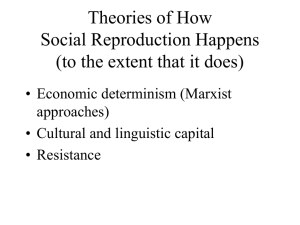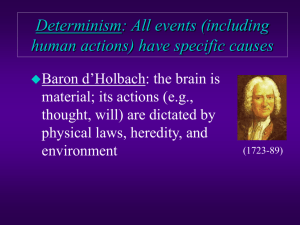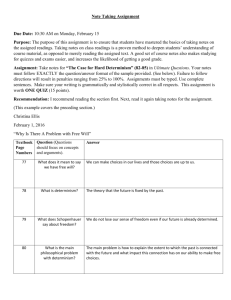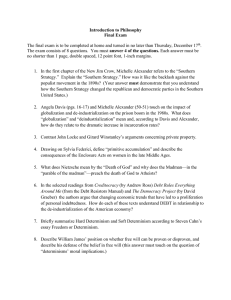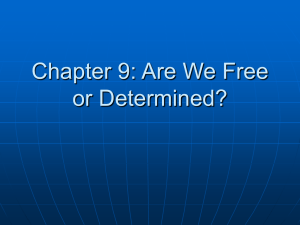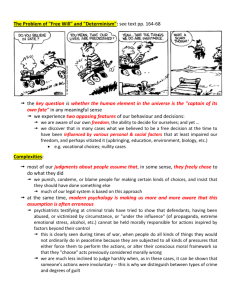File - Briahna Mounteer ePortfolio
advertisement
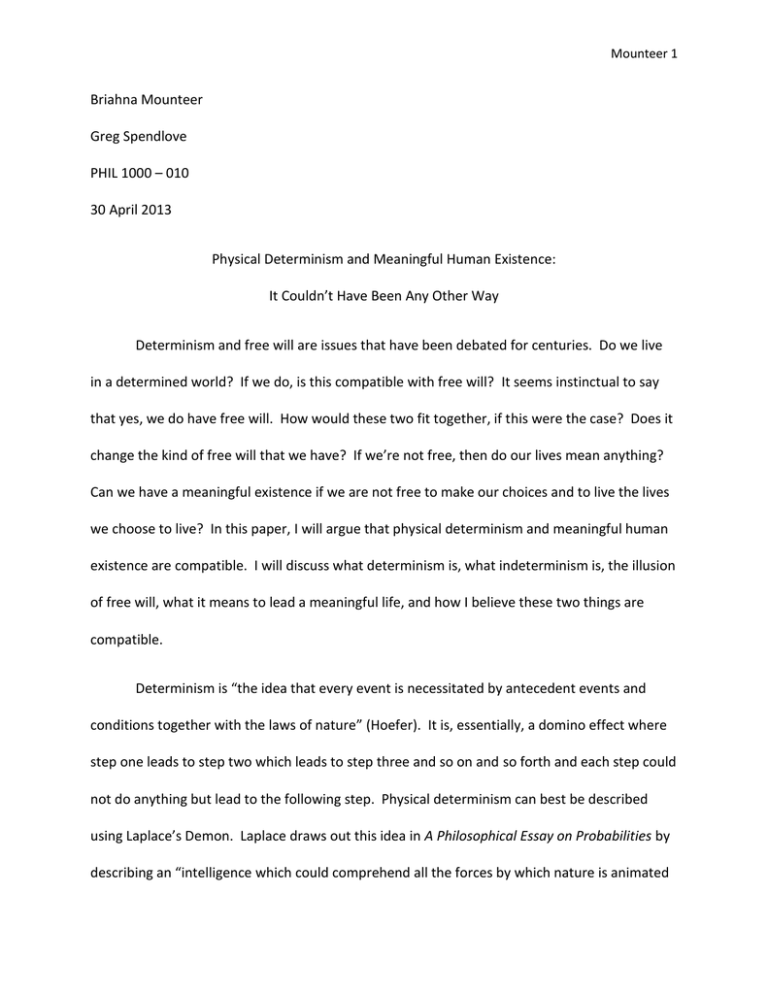
Mounteer 1 Briahna Mounteer Greg Spendlove PHIL 1000 – 010 30 April 2013 Physical Determinism and Meaningful Human Existence: It Couldn’t Have Been Any Other Way Determinism and free will are issues that have been debated for centuries. Do we live in a determined world? If we do, is this compatible with free will? It seems instinctual to say that yes, we do have free will. How would these two fit together, if this were the case? Does it change the kind of free will that we have? If we’re not free, then do our lives mean anything? Can we have a meaningful existence if we are not free to make our choices and to live the lives we choose to live? In this paper, I will argue that physical determinism and meaningful human existence are compatible. I will discuss what determinism is, what indeterminism is, the illusion of free will, what it means to lead a meaningful life, and how I believe these two things are compatible. Determinism is “the idea that every event is necessitated by antecedent events and conditions together with the laws of nature” (Hoefer). It is, essentially, a domino effect where step one leads to step two which leads to step three and so on and so forth and each step could not do anything but lead to the following step. Physical determinism can best be described using Laplace’s Demon. Laplace draws out this idea in A Philosophical Essay on Probabilities by describing an “intelligence which could comprehend all the forces by which nature is animated Mounteer 2 and the respective situation of those who compose it” (4). This demon, as it were, would be able to accurately know the past, the present, and the future with absolute certainty. The problem with determinism is that if everything is determined and is therefore the inevitable or necessary consequence of what came before it, are we free? Do we have free will if the things that happen cannot happen any other way? In his video, “Does Free Will Exist?” Alfred Mele argues that we do have free will but describes free will as having different meanings and uses the analogy of different levels of gasoline that you buy. You can get regular, midgrade, or premium when you go to the gas station. His view of “regular free will” is that of a contemporary compatibilist and he states that it is “the sort of thing presupposed in courts of law when somebody is judged guilty of an offense” (Mele). He lists these criteria as being sane, not being forced or compelled by somebody to do it, and not having a medical condition that forced or compelled you to do something. This view of free will fits in with determinism. The flip side of determinism is indeterminism. Indeterminism requires that there be real alternatives to history, or “real alternative pathways.” These cannot just be fake or illusory. For example, if we were to rewind time to when someone made a decision, they would have been able to make a different decision and reality as we know it now would have been different. Mele’s view of “premium grade free will” includes this ability to do otherwise. Peter van Inwagen argues that this, however, would just be luck and that luck is not free will. He states in his video, “What is Free Will?” that what if we could rewind time to a decision with two options and, all factors and events leading up to this decision were the exact same, were we able to actually make a different decision? Then we could rewind time again and perhaps Mounteer 3 choose differently. Upon doing this a number of times, there does not seem to be a pattern and it appears that chance or luck is the force at work. Therefore, we’re not really making a choice at all. Luck isn’t free will. In his book Free Will, Sam Harris argues that there is only the illusion of free will. Harris states that, “Free will is actually more than an illusion (or less), in that it cannot be made conceptually coherent. Either our wills are determined by prior causes and we are not responsible for them, or they are the product of chance and we are not responsible for them” (4). Harris feels that even the illusion of free will is unnecessary and that losing his sense of free will has increased his feelings of compassion and forgiveness and diminished his sense of entitlement to “the fruits of his own good luck” (45). I agree with Harris that free will is an illusion; I believe that no matter which way you slice it, we are not free. However, unlike Harris, I do feel that the illusion of free will is a necessary thing for humans to have. There are several subjective criteria that I feel constitute a meaningful human existence: Is your life significant? Does it have a purpose? Are you fulfilling your needs? Are you happy? We touch people’s lives every single day: our friends, our family, even strangers. Some of these interactions are note worthy, and some of them are not. For the most part, however, we are important to the people we involve our lives with. We feel that we are worthy of their attention and that they are worthy of ours; our lives are significant. The purpose of your life may be something that you feel God has given you or that you, yourself, have assigned. Most people feel that they are here for a reason and that there is a point to it all. This feeling of purpose is one need of many that human beings have: the sense of community, belonging, Mounteer 4 wanting to share and create beauty, wanting to be happy… The list could go on and on. We strive daily to fulfill these needs and to help those around us fulfill the needs that they have. There are a couple different ways to define the word “happy,” however. In this sense, Dan Haybron said it best when he said that happiness is “a life that goes well for the person leading it” (Haybron). He describes it as a kind of value and says that it refers to a life of “well-being or flourishing” (Haybron). On BBC’s “The Forum,” an ideas discussion show, Alain de Botton argues that humans inherently overplay our own significance and that we, as human beings, “take ourselves quite seriously in order to get out of bed in the morning; otherwise, what’s the point?” (de Botton et al.) de Botton argues that we get so wrapped up in how significant we are that we actually need to be reminded of our own insignificance every once in a while by placing ourselves in positions to feel tiny in the presence of something noble. While this has traditionally been God, de Botton says that science will do quite well. He notes in his book “Religion for Atheists,” that “the stars are in the end no less valuable to mankind as solutions to our megalomania, self-pity and anxiety” (202). Thomas Nagel agrees that we, as humans, find ourselves significant but he argues that this is absurd in his aptly titled article, “The Absurd.” Nagel says that we know that nothing we do will matter in a million years and that “it does not matter now that in a million years nothing we do now will matter” (716). He goes on to say, “Moreover, even if what we did now were going to matter in a million years, how could that keep our present concerns from being absurd?” (716). We take ourselves seriously and justify our existence and it just seems, well, Mounteer 5 absurd to Nagel. “We see ourselves from outside,” he says, “and all the contingency and specificity or our aims and pursuits become clear. Yet when we take this view and recognize what we do as arbitrary, it does not disengage us from life and there lies our absurdity: not in the fact that such an external view can be taken of us, but in the fact that we ourselves can take it, without ceasing to be the persons whose ultimate concerns are so coolly regarded” (720). While Nagel seems to find our very existence and the value we place in our existence absurd, he recognizes the fact that we seem to just go on thriving. “What sustains us, in belief as in action, is not reason or justification, but something more basic than these – for we go on in the same way even after we are convinced that the reasons have given out” (724). Whether you are a compatibilist, who believes in free will and determinism, or an incompatibilist, who believes that there is no way that we can have free will and live in a determined world, I still believe that you can have meaningful human existence and live in a determined world. Even if every single choice you make was the only choice you ever could have made, you can still live a significant, purposeful, need-fulfilling, and happy life. After all, “if nothing we do matters, then all that matters is what we do” (Epiphany). Determinism and free will are issues that will be debated for centuries to come. I believe that we live in a mostly determined world, but that some things are undetermined. I believe that this ideology is compatible with the most basic form of free will (“regular grade”) and that the illusion of being able to do otherwise is more important than actually being able to do otherwise. Even though I believe that we are not free, I think that our lives still mean something and that humans can still have a meaningful existence. After going over what Mounteer 6 determinism and indeterminism are, the illusion of free will, and the criteria to leading a meaningful live, I wholeheartedly believe that physical determinism and meaningful human existence are compatible. Mounteer 7 Works Cited de Botton, Alain. Religion for Atheists: A Non-Believer’s Guide to the Uses of Religion. New York: Pantheon Books, 2012. Print. de Botton, Alain, Bridget Kendall, Alexandre Mitchell, and Susan Wolf. “Meaning in Life.” The Forum.BBC. BBC World Service. 24 Feb. 2013. Radio. “Epiphany.” Angel: Season Two. Writ. Tim Minear. Dir. Thomas J. Wright. Warner Brothers, 2002. DVD. Harris, Sam. Free Will. New York: Free Press, 2012. Print. Haybron, Dan. "Happiness." The Stanford Encyclopedia of Philosophy (Fall 2011 Edition), Edward N. Zalta (ed.). Web. 29 Apr. 2013. Hoefer, Carl. "Causal Determinism." The Stanford Encyclopedia of Philosophy (Spring 2010 Edition), Edward N. Zalta (ed.). Web. 29 Apr. 2013. Laplace, Pierre Simon. A Philosophical Essay on Probabilities. London: Chapman & Hall, 1902. Print. Mele, Alfred. “Does Free Will Exist?” Online video. Big Think. Big Think. Web. 29 Apr. 2013. Nagel, Thomas. “The Absurd.” The Journal of Philosophy 68.20 (1971): 716-24. JSTOR. 29 Apr. 2013. van Inwagen, Peter. “What is Free Will?” Online video. Closer To Truth. The Kuhn Foundation. Web. 29 Apr. 2013.
